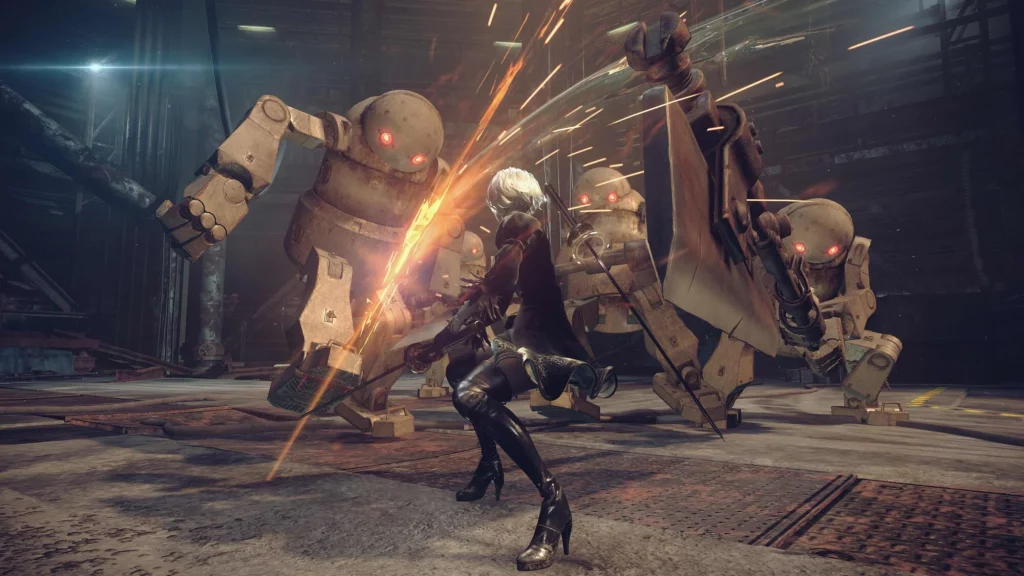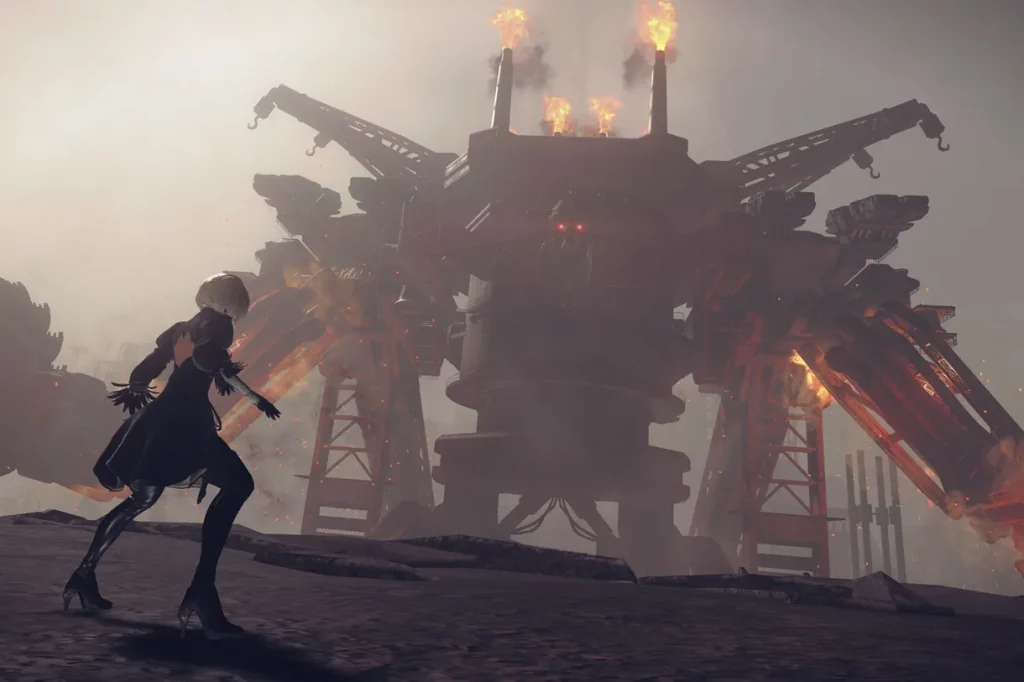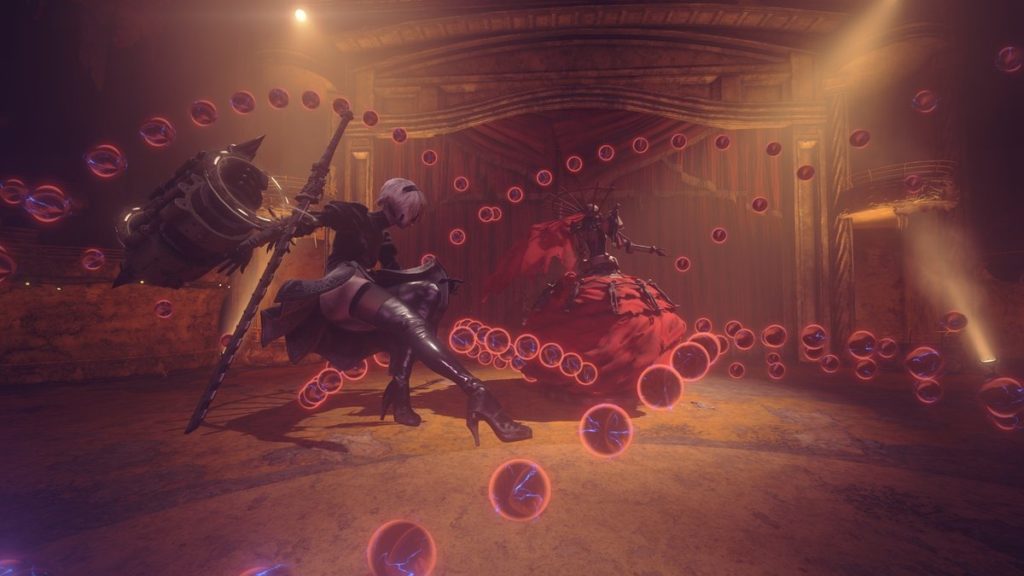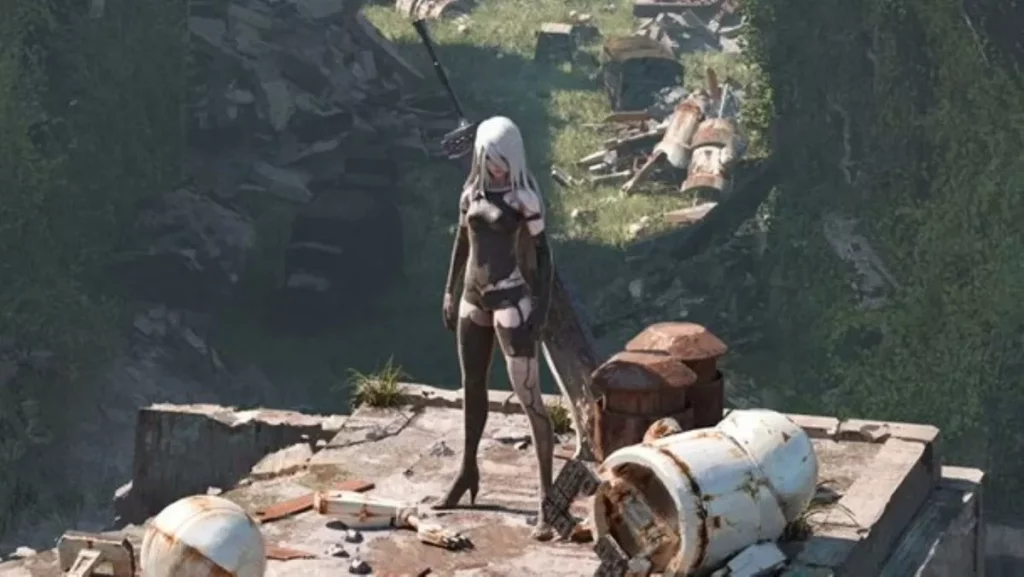Folks, I tried to play Nier: Automata. I really did. But I don’t think I have it in me to finish it.
As someone who counts the original Nier as one of my favorite gaming experiences of all time, I’m as disappointed as anyone that the sequel to that experience fell short, but that’s the way the cookie crumbles.

Here now are some of the problems I had with the game:
The Intro is BS
The introduction to the game can take up to 40 minutes to get through. At no point during those 40 minutes are you allowed to save the game. If you die, you start all over again.
The saving grace is that you can adjust the difficulty at any time, so there’s nothing stopping you from dropping to easy mode just to breeze through it all (easy mode lets you “auto battle,” where the game will automatically dodge and pick the best attacks for you). But it still feels like a bad design decision that could have been easily avoided.
The Game World is Too Big
Like its predecessor, Automata is really big on having you backtrack through the same handful of large(ish) environments to do sidequests (and even main quests). But the environments in OG Nier were small enough to be manageable. Backtracking was still a pain (and is arguably a mark against the game), but not quite enough of a pain to dissuade nominally persistent players.
This is no longer true In Automata. The maps are all that much bigger, such that backtracking takes that much more time to do (even with fast travel factored in). It killed the appeal of sidequesting, which is a shame, because some (though not all) of the sidequests have really interesting story and character beats that are worth your time. Except they’re actually not worth your time because of how much busywork they require.

The Combat System Breaks One of my Cardinal Rules
I don’t have a name for this rule, but it’s something I’ve followed (and discussed?) more than once before:
If self-imposing certain rules, restrictions, or limitations makes a game more enjoyable on subsequent playthroughs, that’s probably the sign of a well designed game.
If self-imposing certain rules, restrictions, or limitations is required just to get through the initial playthrough, that’s probably the sign of a poorly designed game.
(let’s just call it Christian’s Rule for now)
Automata falls into the latter camp. The combat system has all sorts of depth to it. Seriously, read this guy here if you don’t believe me.
But none of the depth is necessary. All you really need to do to win is to know how to dodge, and remember to occasionally mix up light and strong attacks (at least on easy and normal difficulty).
Sure, you can go beyond that, but you’d be in violation of Christian’s Rule. Maybe your idea of having fun is to delve into complex systems that the game doesn’t really reward you for taking advantage of, where any enjoyment comes from some sense of accomplishment and personal pride.
But you can’t ask others to do so, and you especially can’t ask others to do so before you give their opinion the time of day. Imagine if you told someone that their thoughts on a film don’t count because they haven’t tried watching it backwards, or that they’re not allowed to dislike checkers unless they integrate in a new ruleset involving a six-sided die.

videolamer’s Rule
I am reminded of another rule, one that’s shared by at least two members of this website:
The name of the studio on the back of the box tells you nothing meaningful about the quality of a given game
The obvious reason is that games are (usually) made by multiple people, and any significant staff turnover can and will lead to different results. If Studio A makes the hit game Shootman X, and follows it up ten years later with Shootman X2, how many staff are they realistically going to share? Can you really make any guarantees about the quality of the sequel?
This is particularly true of Platinum Games. Over the years they’ve proven that they’re essentially guns for hire, who will work with any studio or director to help create their vision. True, they may mainly make action games, but I think it’s a fallacy to say that Platinum has anything verging on a “house style.”
For example, Vanquish, Bayonetta, and Metal Gear Rising are all Platinum games. One was directed by Shinji Mikami, one by Hideki Kamiya, and one (sort of) by Hideo Kojima (but not really – I’m pretty sure Platinum was largely left to their own devices for Rising). All three games also have very different combat systems. I don’t think this is a coincidence.
It’s the same deal with Automata. The fact that Platinum helped make it doesn’t really tell us anything about the quality of its combat. Which is why it’s actually not surprising to me that it isn’t very good (nor would I be shocked if it was good. That’s the point – it’s more of a crapshoot than you might think).

Automata Lacks Heart
This is a big one. OG Nier is a weird, janky game, but most of its fans will tell you that they pushed through because of the characters. The story is extremely character focused, and it doesn’t take long to find yourself invested in both their struggles and their comradery. The game has an extremely strong sense of humanity at its core.
Automata does not. Its characters are all robots and androids who, at best, try to emulate human behaviors. However, their efforts (intentionally) feel hollow and more than a little creepy. And while that may indeed be part of the point, it also makes it hard to give a damn about what happens to them.
Indeed, Automata is less interested in its characters than it is in tackling all sorts of bigger philosophical concepts. And that right there is a showstopper.
When a story focuses on its characters – when it features triumphs and struggles and fears that are common to the general human condition – it’s going to resonate with a lot of people, regardless of their age or nationality or background. That’s why a game like OG Nier clicks with so many folks.
But when you start delving into philosophy, and you’re not super well read on actual philosophy, you are going to wind up with the gaming equivalent of iam14andthisisdeep.
I’ve seen this exact phenomenon in the wild. There are threads on reddit, message boards, etc where people with actual backgrounds in philosophy, literature, and theology found Automata to be as deep as a puddle – while also acknowledging that if you have no experience with this stuff, it would almost certainly blow your mind.
And I don’t even think you have to go that far. If all you have is a decent background in good science fiction, then all of the game’s themes about machines and consciousness are going to be old hat.
I’m thoroughly convinced that Automata is a story made for a much smaller, less universal demographic than its predecessor. In that case, it’s no surprise that it falls short.

Minor Stuff
Here is a small list of other, minor issues:
- The in-game map is basically useless. It doesn’t have enough detail to tell you where specific objectives are, nor does it do a great job of letting you know if a map marker is in an area you can access yet.
- It’s often hard to know where you can and cannot go. You may see some intricate outcropping in the rocks, or a fallen building that looks like you can jump on it. But you can’t. The only way to figure this out is to throw yourself at what look like boundary areas on the map until you figure out where the actual boundaries are.
- The intro feels like a discarded level from Ikaruga. Sure enough, Yoko Taro has stated that he was partly inspired by that game when making Automata, but to me it felt less like inspiration and more like ripping off.
- The PC port is awful. This is a known thing, but I was still surprised at just how janky it gets. Put it this way – technically my laptop barely meets the system requirements for Resident Evil Village, but when that game runs, the performance is excellent. Nier Automata somehow runs worse.
Beware Yoko Taro?
Yoko Taro is one of those director/auters who gets the benefit of the doubt from critics and gamers. But as someone who is generally averse to hero-worship, I remain skeptical.
Don’t get me wrong – it’s not like I think the man is a hack. It’s more that his games tend to be messy and undisciplined. Sometimes that’s part of the charm, or it is something you can tolerate, but other times it is a liability. It’s not something I consider a knock against him. If anything, it makes him feel that much more human and relatable.
Be that as it may, it also means that not all of his games are going to be winners, or they simply may not click with everyone. But some folks have a hard time coming to terms with that. Instead, they’d rather make excuses. I’ve seen arguments in defense of Automata that include:
- The philosophical stuff is SUPPOSED to be shallow and overblown. It’s making fun of that kind of stuff.
- The intro is SUPPOSED to be frustrating. It ties into the themes of the game.
- The repetitive sidequests are intentional. Yoko Taro is making fun of them, and trolling the player.
And so on and so forth.

Reasonable people can disagree on this, but – When the only thing consistent about an author is that he likes to mess with the reader, how do you trust them? How do you know what is or isn’t a trick? How do any of us know if any of this jank is really intentional? And how can you be sure that this persona isn’t a crutch the author leans on as an excuse for their worst tendencies?
Going further, at what point does trolling the player go from playfully subversive, to disrespectful and mean spirited?
Postmodernism
In this postmodern, post-irony world, it often feels like these questions all have the same answer, namely “Whatever I feel like the answer should be based on my current mood and proclivities, which may not be the answer I give you tomorrow”
This (in my opinion) really sucks when combined with the Internet’s other tendency to see everything in black and white. Everything is subjective, and the truth can shift on a whim, but every game is also “the best” or “the worst” (and anyone who thinks differently is wrong).
AKA the Internet really just likes to hear itself talk.
Because that’s where I am with the game. I think it has a lot of mean spirited, trolling BS that has no business existing. If Taro put this in intentionally, then I think he should be called out on it. It’s not funny or clever.
Conclusion
Like OG Nier, Automata is one of those games that isn’t going to click with everyone (despite what the internet may tell you). That’s just the way it is.
But I also can’t help but think that, beyond that, it’s the kind of game where your experience is going to be based in large part by your overall cultural literacy. I hate how mean spirited it sounds to say “Game X is only good to people who’ve never picked up a book,” but it’s something I’ve felt more times than I can count.
And while it may indeed be mean spirited, I really don’t care any more. The older one gets, and the more precious one’s gaming time becomes, the more vital it is that we avoid wasting that time on experiences that no longer suit us. That was definitely the case for me here, and if you’re reading this website, it’s likely to be the case for you too.


I’m sorry to hear this – I enjoyed Nier (Gestalt) quite a bit when it came out, and I have Automata (PS4) sitting on a shelf, unplayed.
I get the impression Yoko Taro is kind of like Kotaro Uchikoshi (Zero Escape series) in that he likes exploring classic philosophical questions or dilemmas, but never really goes that deep and handwaves any real explanation of what’s going on. There’s a place for that for sure – even in the literary world, there are books like Sophie’s World which explore a broad range of philosophies at a surface level, and they’re relatively popular and good introductions – but pretending that Nier Gestalt or 999 are actually deep games seems like it’s going a little far. I loved 999, and the twists are wild, but I’d recommend it for the twists and the characters, not the tangential exploration of Theseus’ Ship that Seven goes into in one of the routes.
At its heart, Nier Gestalt isn’t really asking (or answering) questions that are all that different from other forms of media, and I wouldn’t expect Nier Automata to go all that much further. Sure, there are twists, and the shock involved might be augmented by the fact that you as the player did the things, but I think (like Persona) people look at the games, see that they’re stylish or unusual, and assume they have something truly new or deep to say.
That’s exactly the thing – Gestalt is a game about its characters. The overarching themes are just … well, there’s not much there.
Automata, in my view, is more about the themes and ideas than the characters. So in that sense, it’s not too surprising to me that I might like one and not the other.
If anything, i’m the fool for letting the Greater Internet – what with it’s mostly shallow, surface level appreciation of things – fool me into thinking the games were more alike than different.
I love both games, though I found automata harder to love despite its reputation as more accessible than its predecessor. I agree the intro is bullshit, they haven’t given you enough time to learn the combat by the time you fight the boss so it’s completely reasonable to die and then you have to start all over. On the other hand one of my favorite aspects of gestalt was how it played with genres so the shmup section was welcome. I wish automata leaned more into that playfulness than it did.
I may argue the shift in focus from characters to themes is more a matter of degree than kind but I do think gestalt has more heart.
My biggest issue with automata is that I got bogged down with sidequests for a while. When I chose to do more critical path stuff it revitalized my interest. Then I came back for more side stuff once I had fast travel. That really helped me since traversing the whole world for a side quest does feel like too much.
I felt some of that same push and pull depending on whether I did sidequests or main quest stuff. If anyone does choose to play it, I would heartily recommend avoiding sidequests as much as possible until at least you get fast travel.